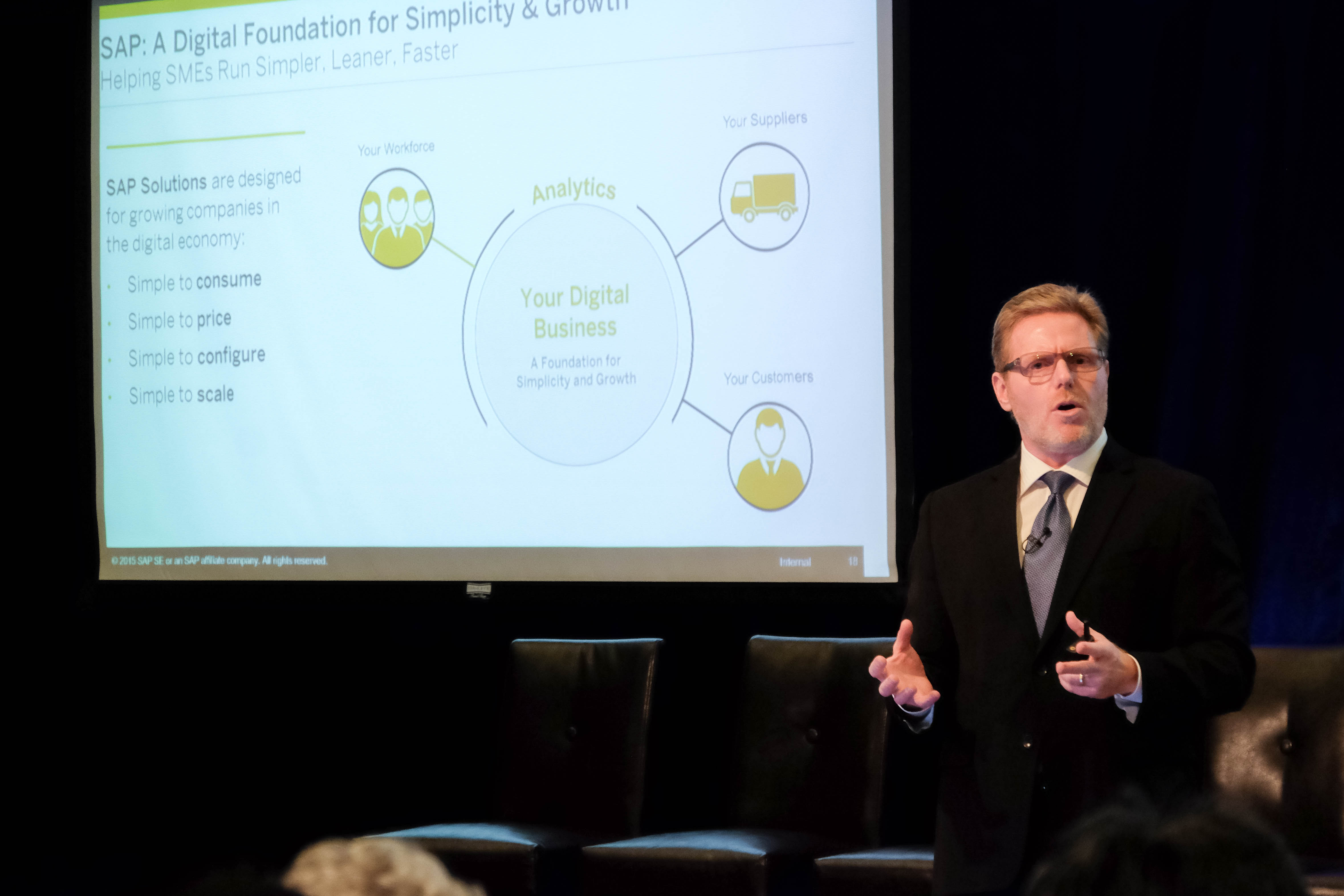
- SAP Community
- Products and Technology
- Enterprise Resource Planning
- ERP Blogs by SAP
- SAP SME Summit 2015: Simplification and Growth
Enterprise Resource Planning Blogs by SAP
Get insights and updates about cloud ERP and RISE with SAP, SAP S/4HANA and SAP S/4HANA Cloud, and more enterprise management capabilities with SAP blog posts.
Turn on suggestions
Auto-suggest helps you quickly narrow down your search results by suggesting possible matches as you type.
Showing results for
David3
Active Participant
Options
- Subscribe to RSS Feed
- Mark as New
- Mark as Read
- Bookmark
- Subscribe
- Printer Friendly Page
- Report Inappropriate Content
11-13-2015
5:44 PM
The 2015 SAP Small and Midsize Enterprise (SME) Summit (#SAPSMESummit) held in New York was all about simplification and growth.
In the opening keynote, Rodolpho Cardenuto, the president of global partner operations at SAP, reminded us how important SMEs are to the global economy. Although small in size, SMEs make up 95% of all companies and employ 55% of the world’s workforce.
Growth is obviously a key objective for SMEs. The global, digital economy presents many new business opportunities, but big success is rare and doesn’t come easy. The SMEs that see the openings and respond quickly are surging ahead. The trick however, is not to let complexity creep into the business as it grows.

“Business simplification is much more important to SMEs than ever before,” said Cardenuto. He backed his statement with new research conducted by Knowledge@Wharton and SAP. The survey titled, “Simplifying the Future of Work,” reveals how important it is for SMEs to design their businesses to run simple from the beginning.
According to the survey, 72% of SME leaders and team members say business complexity has hurt efforts to meet process and decision making goals. Over 30% said it "strongly inhibited" that ability, and 58% pointed directly to technology complexity as the culprit.
Avoiding technology to reduce complexity is certainly not an option. SMEs must leverage IT solutions to participate in the digital economy. But SMEs often get caught in the trap of using one-off IT solutions to meet short term needs. That approach quickly results in problems as more disjointed solutions are added to the mix. The IT landscape becomes more costly and difficult to manage, and business processes and employees get bogged down by inefficiency.
Building a business to Run Simple with efficiency from the start may seem logical, but the survey showed that only 49% of senior leaders believe business simplification is of significant strategic importance today. That number jumps to 65% when asked if they believe it will be of significant strategic importance within the next three years.
“To enable digital transformation, SMEs need to build a foundation for growth and simplification,” said Cardenuto. The earlier SMEs can implement systems that simplify business processes, transactions, and reporting the faster they can react, respond, and win more business.
“Digitizing the core business is the first step,” said Cardenuto. An integrated ERP solution designed for SMEs will pull together financial, supplier, customer, and workforce processes and information. It will also centralize and standardize business data, enabling real-time reporting and analytics.
The implementation of a core ERP system also needs to be simple. “SMEs need immediate ROI from IT investments,” said Cardenuto. “Solutions need to be easy to consume, price, and configure, and they must be able to scale with the business.”
The message to SMEs in the keynote was clear: focus on simplifying your business now – in the long run, it will perform better and grow faster.
Read the full Knowledge@Wharton white paper and check out the infographic.
Related content:
How Prime Meats Cuts Through Business Complexity
Zachry Construction Boosts Costing Accuracy 50% with New ERP
High-Tech ERP Helps EvoShield Protect Athletes and Grow Business
Connect with me on Twitter and LinkedIn
- SAP Managed Tags:
- Digital Technologies,
- SAP Business One
You must be a registered user to add a comment. If you've already registered, sign in. Otherwise, register and sign in.
Labels in this area
-
Artificial Intelligence (AI)
1 -
Business Trends
363 -
Business Trends
29 -
Customer COE Basics and Fundamentals
1 -
Digital Transformation with Cloud ERP (DT)
1 -
Event Information
461 -
Event Information
28 -
Expert Insights
114 -
Expert Insights
188 -
General
1 -
Governance and Organization
1 -
Introduction
1 -
Life at SAP
414 -
Life at SAP
2 -
Product Updates
4,679 -
Product Updates
273 -
Roadmap and Strategy
1 -
Technology Updates
1,499 -
Technology Updates
100
Related Content
- Product Expert Training 2023 – The next chapter of success in Enterprise Resource Planning Blogs by SAP
- SAP Billing and Revenue Innovation Management Localization: Sustainable Compliance for Your Recurring Revenue Business in Enterprise Resource Planning Blogs by SAP
- Initial Adoption Vs Future Readiness for S/4HANA Public Cloud, Private Cloud and On-Prem Deployments in Enterprise Resource Planning Blogs by Members
- SAP S/4HANA 2022 System Conversion Steps & Details – How to be prepared? in Enterprise Resource Planning Blogs by SAP
- SAP S/4HANA Cloud, private edition, and SAP S/4HANA for EHS | 2022 release in Enterprise Resource Planning Blogs by SAP
Top kudoed authors
| User | Count |
|---|---|
| 7 | |
| 6 | |
| 5 | |
| 4 | |
| 4 | |
| 4 | |
| 3 | |
| 3 | |
| 3 | |
| 3 |